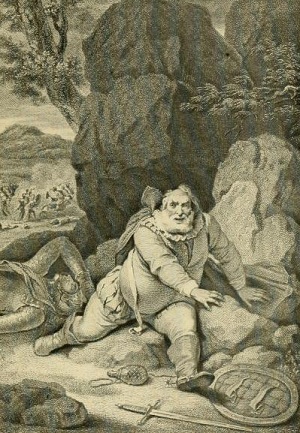| directory |
| home | contact |
|
|||||||||||||||
| search | |||||||||||||||
Falstaff and Queen Elizabeth IShakespeare ends Henry IV, Part II (1598) unsure of the future of the jolly Sir John Falstaff:If you be not tooHowever, very shortly after the completion of Henry IV, Part II, Shakespeare wrote The Merry Wives of Windsor (1599), featuring the errant knight in the starring role. What prompted Shakespeare to resurrect Falstaff so soon? Two independent sources confirm that Shakespeare revived Falstaff at the insistence of Queen Elizabeth I, who had been delighted by Falstaff's presence in the Henry IV plays. John Dennis, a literary critic who adapted The Merry Wives of Windsor in 1702, asserted, “I know very well that it hath pleased one of the greatest queens that ever was in the world ... This comedy was written at her command, and by her direction, and she was so eager to see it acted that she commanded it to be finished in fourteen days; and was afterwards, as tradition tells us, very well pleased at the representation." Moreover, Nicholas Rowe, in his Life of Shakespeare (1709), reports that the Queen "was so well pleased with that admirable character of Falstaff in the two parts of Henry IV that she commanded him to continue it for one play more, and to show him in love." There is evidence in the play itself to corroborate the story documented by Rowe and Dennis. Unlike any of his other dramas, Shakespeare deals exclusively with English society in The Merry Wives of Windsor, localizing the play at Windsor, and making overt complementary references to Windsor Castle. And Falstaff is the romantic lead, determined to woo the wives of Ford and Page, two gentlemen of Windsor. The pressure placed on Shakespeare to write The Merry Wives of Windsor might explain why the play is not as brilliant as his other work of the same period. The Falstaff we meet in The Merry Wives of Windsor is a mere simulacrum of his former self, virtually devoid of the wit and power granted to him in the history plays. The comical genius of the Falstaff in the Henry IV plays, with his "unfettered indulgence in sensual pleasures, his exuberant mendacity and love of his own ease, [and] his unreverend way of life" (Lee 245), is similar to the Falstaff in the The Merry Wives in name only. How to cite this article:_____ Reference Lee, Sir Sidney. A Life of William Shakespeare. New York: Dover Publications, 1968. _____ Related Articles |

|
©1999-2021 Shakespeare Online. All Rights Reserved.